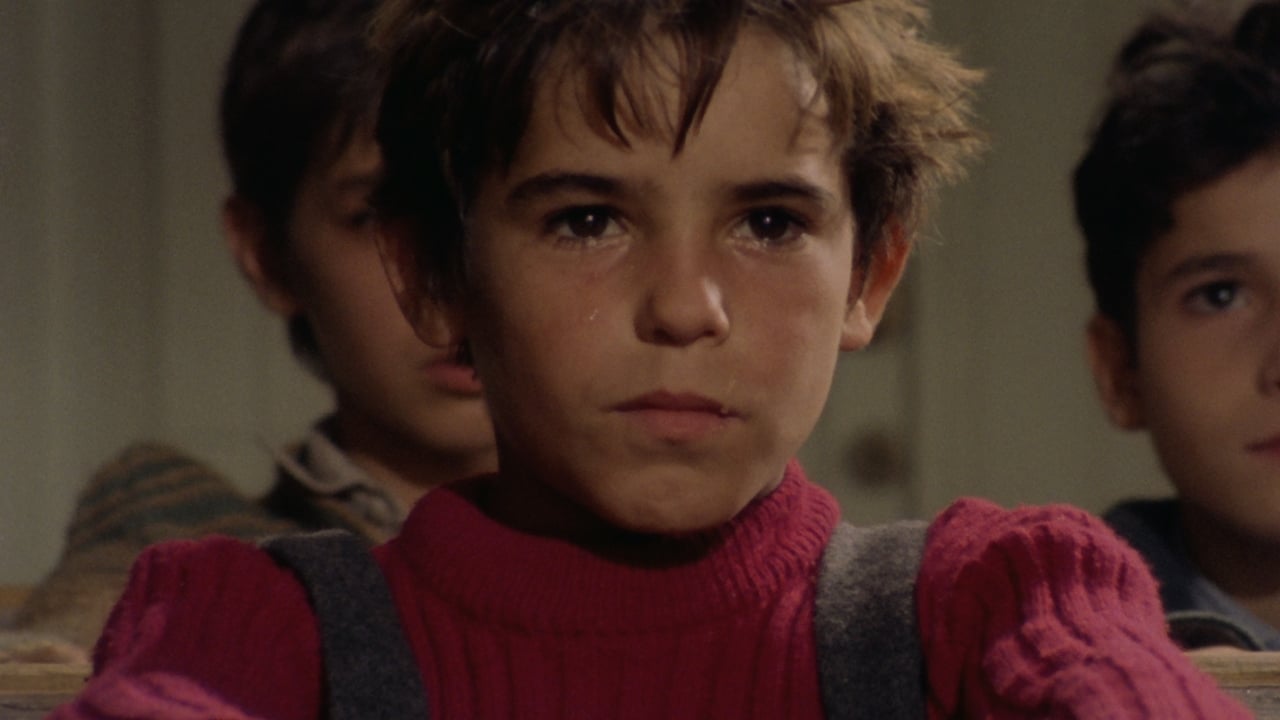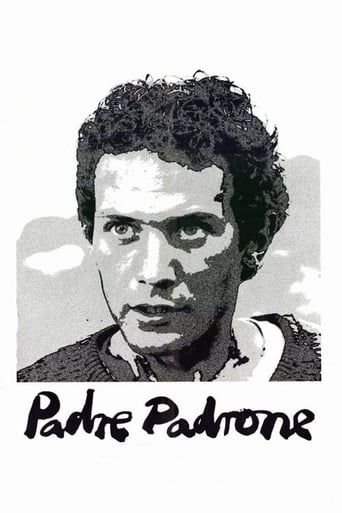



Really Surprised!
Most undeservingly overhyped movie of all time??
This movie was so-so. It had it's moments, but wasn't the greatest.
View MoreThe tone of this movie is interesting -- the stakes are both dramatic and high, but it's balanced with a lot of fun, tongue and cheek dialogue.
View More"Padre Padrone" ("Father Master" in Italian) is inspired from Gavino Ledda's autobiography. The book provides invaluable insight on living conditions and bigger-than-life anecdotes. Remarkably, the movie transforms this authentic account into a metaphor on traditions, indigence, knowledge, emancipation and growing up.The movie only adapts selected passages of the book as usual (notably because of length), but interestingly adds a few scenes: men arguing and promising to leave Sardinia during the religious procession, Gavino peeing from the truck taking them away, Gavino and Cesare speaking Latin in the tank, etc. Logically, these scenes have a strong visual and symbolic impact. Also, the father's role is more developed in the movie and we perceive how he thinks: he is a victim of the system like Gavino, even though they fight back differently. *** WARNING: CONTAINS SPOILERS ***The metaphorical dimension is first expressed by the presence of Ledda himself at the beginning and at the end: the movie is hence put into perspective; we understand it carries a message. The actual life of Ledda is almost an allegory in itself: mostly alone when he was a child with limited communication possibilities, illiterate, he ultimately becomes a famous linguist.The movie illustrates this journey with different symbols. First with silence: a bell rings when he is alone in the mountains, but also in military class. He hence remains lonely despite being surrounded by people, because he does not understand. Silence is also depicted by the fact Gavino cuts his lips twice: once to pretend he was attacked, once precisely to remain mute.Progressively, Gavino breaks free from his muteness and communicates. This initially comes through non-verbal means: music. He initially tries to play Strauss' waltz on his accordion and another shepherd in the mountain answers with a flute. He then catches it on his radio, and thus passes the army test. Later on, he whistles Mozart's clarinet concerto after his father destroys the radio.He eventually learns Italian and articulated communication. He finally is able to answer back to his father. Interestingly, the speech he voices to him from his bed is memorised: this reminds of the father's speech at the beginning in school, which is memorised as well. The meaning seems to be: one can progress and learn, but can never completely relinquish one's heritage. Other illustrations of this topic: the movie starts and ends at school, when Gavino is young; Gavino does not understand the class at the army, as his father did not understand the olive purchaser's speech; Gavino recites word from the dictionary, as his father recited multiplications; when Gavino comes back to the village, he is afraid his father will strike him, just like he was before in the mountains; his father forbids him to eat and locks the food closet, just like he did in the mountains; Ledda says at then end: "I might abuse my new privilege, as my father did".Indeed, everywhere traditions are enduring and difficult to escape from. In the kitchen, the father wants to strike the adult Gavino with a stick just like the shepherd stroke Sebastiano in the mountains. After the father violently hit the young Gavino, he sings a Sardinian tune which will be repeated during the religious procession when Gavino is adult. Additionally, at this fabulous procession, the young men carry a heavy statue that we visualise as the father: they are dominated by traditions in different forms (religion, father, master).The resulting general psychological tension is visually expressed by instability: even when shots are fixed, the camera (apparently hand-held) always moves slightly. Traditions are a succession of prohibitions: don't leave the sheepfold, don't talk to other shepherds, don't eat unless you work, don't speak Sardinian in the army. Growing up, more than transgressing these, is being able to bypass them: respectively becoming an adult, learning music, studying, learning Italian.The movie has a universal dimension. Nobody bears a name, apart from Gavino, Cesare (the true friend) and Sebastiano (the mountain legend): the father, the mother, Gavino's sisters and brothers, other children and adults. This lack of identity is highlighted by the young men during the religious procession: "We have no name, we are just the padrone's this and that". It is not just Ledda's story: we see other children and adults with the same issues and desires. The shots on the children's faces at the beginning and at the end (with their inner thoughts at the beginning) are striking. These thoughts are horrible, like the ones Gavino's family has near Sebastiano's deathbed, yet we understand them: it is how necessity forces people to think. Some scenes are spectacular, for instance when the father fights with Gavino in the kitchen. It plays on different levels. Abstract: close shot on hands washing, on a hand hitting the red table to have food. Symbolic: father and son fight in obscurity, expressing their subconscious desire to get rid of each other; it is the dark conflict between tradition and emancipation. Ironic: they fight as Mozart's beautiful music plays; afterwards, the mother sings. Ambiguous: when Gavino fetches his suitcase afterwards, he first ignores his father, then puts his forehead on his leg. He still loves him despite everything. And his father first wants to caress his head, then strike it. We unexpectedly move on to the next scene, so will never know what actually happened, but it does not matter: the father's emotion stays suspended between love and hate. The following shot is magnificently nostalgic: we silently drive away from the village, looking backwards. This subjective view echoes the scene when Gavino previously left at the back of the truck: we now leave with him, apparently forever. In summary, "Padre Pardone" is gripping, with social, psychological and symbolic reach. Be warned, it is violent: harsh living conditions, harassment, child abuse, bestiality. However, it progressively delivers an optimistic message: through education and hard work, one can escape one's condition.
View MoreAlready in the beginning the viewers are told that this is the story of a linguist who wrote a book. The story starts, then, with a father, a shepherd, as he takes his little son out of the classroom to the mountains to help guard the area and the flocks of sheep. When other boys laugh, the father tells them their day will come too, and it does. In the poor Sardinia, the life of boys is that of men. If they rebel or fail, their fathers exercise violence against them. A Poor kid's comfort: the father promises Gavino that when he'd be 20, he'd be free to go to elementary school. Humor and something of a naive charm are sparkled along the film, but the roughness of this life comes through and through. Eventually, the time for elementary school arrives, and Gavino takes full advantage of it. Still, you stay in doubt if he will ever be really free from the spirit and the mentality of his father.
View More"Padre Padrone" (Italian, 1977): Directed by Paolo and Vittoria Taviani. A Sardinian boy grows up under the crude and violent shadow of his sheepherder father. Family life is a combination of mind-numbing boredom and crackling moments of fear. The years pass, and almost by accident, the boy (now a man of 20) becomes involved in the larger world. Here begins his struggle to break away from the tyranny of "Father/Master", and make use all that awaits him but the teachings of his father are NOT that easily left behind. It's an interesting psychological story shown in typical Italian 70's fashion low production values, lots of overdubbing, and only a slight interest in creating an artful shot (no, most Italian films are NOT Fellini or Antonioni). However, THIS one is worth following. The payoff IS in the story and its message. It's a strong film that reminded me of "Pelle the Conqueror". And a second night of pondering: "Padre Padrone" ("Father Master") is a truly unique look at the relationship between fathers and sons. It's not a pastel image, that's for sure, but it raises some very interesting questions that I think most sons will recognize at some deep, unspoken level. As is always the case with a smart work of Art, the visual level is but the entryway to a broader topic which allows more viewers to relate. No, WE'RE NOT Sardinian, sheep herders, uneducated, or dirt floor poor. No, our fathers probably did not behave exactly as this father did...yet nearly every one of us can sense that the feelings we held towards our fathers (as boys) are somehow addressed in this film. He held the power. To get "out from under" his looming protections and threats, we had to leave. There was no other way to break free of the family dynamic. Upon return, for a visit or temporary living circumstance, we found he had not changed - no one in the family had changed - and the certainty we had that WE had changed while away, was only a facade days away from cracking or collapsing. What did we do? We left again, returned, left, visited, avoided, watched, and waited for "things" to change to SUCH a degree, we could now all settle into a new set of roles.
View MoreVittorio and Paolo Taviani are surely one of the most important Italian directors ever and just like all the great masters they often have their not so brilliant movies, but "Padre Pardone" certainly belongs to the best they ever made. It's all based on a true story and sometimes people tend to forget that there are places that God forget. In an agricultural area in Sardinia some folks pretend it's better to take care of the sheeps rather than scoring well at school. The young Gavino (Fabrizio Forte) goes to his school but one day he's father comes in the classroom telling him that his schooldays are over and that it is time to take up his duty as shepherd. The brothers Taviani are masters in filming the useless factors of the job as we see a young boy who absolutely has no interest in the job he got by his father, and we see some explicit scenes in where the almighty father beat his children. Schoking that's for sure and if the Gavino grows older we see his hunger to learn something (the poor boy couldn't read) as soon as he must enter the world of the army which is in total contrast with the world of the hills where sheep run. The story itself is rather hard to bear and you often shake your head by disbelief but still the Taviani-brothers are opting for a sober and poetic approach of the problem that it looks like you're viewing some touristic documentary of an area that God forgot. "Padre pardone" is certainly the kind of movie that will have both its lovers and enemies but having said that, you know that "Padre Pardone" belongs to the classic section of the Italian cinema that will never be forgotten.
View More